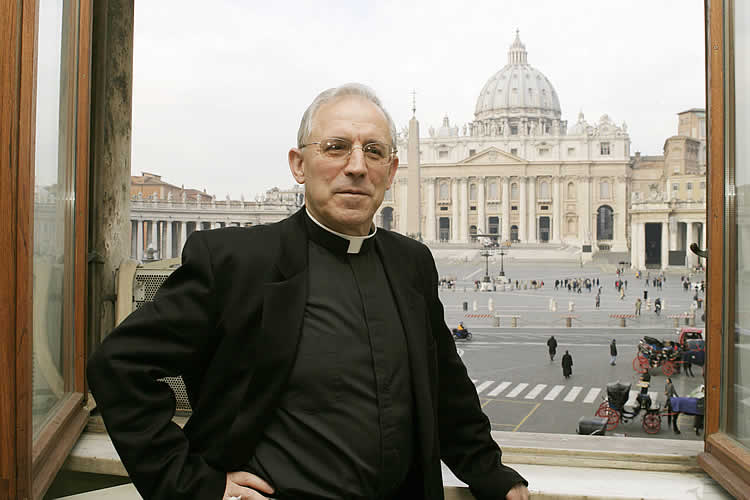Q.- Why a document on authority and obedience?
A. These two concepts have suffered very important changes during the past years, be it in the cultural, ecclesial or religious arena, with both positive and negative consequences. As if by osmosis, the influence of today’s culture is felt in the Church. In the religious life authority and obedience are understood under the light of Jesus and his Gospel.
The Council talked of “religious obedience, far from undermining the dignity of the human person, leads him, through the ample freedom of the sons of God, to maturity” (PC 14). The document talks of obedience as an expression of freedom, because this obedience is filial and not that of a slave. To obey the Father is to acknowledge oneself as child, like Jesus; it is to consider oneself as the Father’s beloved child.
I would say that the health of the religious life depends more importantly on the good health of obedience and authority.
In seven languages
Q. How was the text conceived?
A. In May 2004, in a council with 16 superiors general from the USG and UISG, the topic pertinent to the service of authority in the communitarian life was taken up. It aroused interest among them and was then considered as truly helpful for the consecrated life. Consequently, the Congregation in its plenary session, composed of 19 Cardinals, 7 Bishops and 8 Superiors General, tackled the matter. It was on 28-30 September 2005. As preparation for this encounter an “instrumentum laboris” was drafted containing the theme and some guide for reflection. A couple of inputs on the topic were made followed by lengthy discussion. All the papers were duly examined and the drafting began. There were several suggestions made over its outline. Then there was the tedious process of drafting and redrafting, consultations and critiquing at all levels, etc. Finally at the beginning of the year the final draft was out. It was then sent to the Congregation of Doctrine and Faith and to the Holy Father for approval. On May 5, 2008 Pope Benedict XVI approved the document and ordered its publication slated on the Solemnity of the Pentecost on May 11. The document was presented before the General Assembly of the General Superiors where 94 from the male and 85 from the female congregations attended. The document was translated into seven languages, namely, Italian, Spanish, English, French, German, Polish and Portuguese.
Searching the will of God
Q. What is the key in the reading of the document?
A. The very title of the document gives the key to its reading: “Your face I will seek, Lord”. Every Christian, every human being, to some extent, is in search of truth and of happiness. What is the will of God for me? In consecrated life that search is done in the community, together with the brothers and guided by the superior. The document talks of the superior, of the brother and the community living and working together like pilgrims, in search of the face of God, that is, of His will. Only God can fill our hearts, as our Father St. Augustine would say. For that reason authority and obedience have to search together for the will of God and both have to listen and obey that will. The word of God serves to guide this search and the longing for happiness and peace. The model for this listening and obedience is Jesus. The will of the Father is the nourishment that sustains Jesus, making his whole life a listening and an embracing of the Father, to whom he “is obedient even unto death, death on the cross”. This drama in his life did not make him feel abandoned by the love of the Father. This Christological dimension shines and serves as foundation to the document.
Vow of obedience
Q.- Which aspects are emphasized in the document?
A. Among the important themes of the document I would point out the following: human mediation (no. 9), the community discernment (no. 20, e), and the numbers 13, 20 and 25 which offer pastoral guide on how the superior should act in the search of the will of God, in the common life and in the mission. Likewise important is the topic on difficult obedience (no. 26), objections of conscience (no. 27) and the difficult kinds of authority (no. 28).
It is also interesting to consider the vow of obedience in the countercultural context, like reaction to individualism and anarchic autonomy or absolute libertarianism.
In short this document contains a complete and positive presentation of the complex and difficult subjects such as the service of authority and obedience. I find it a profound and realistic document, originally and extraordinarily open to the actual situation: suggestive and encouraging.
The community


Eusebio Hernández has initiated and supervised the drafting of the document.Q.- What is the importance today of authority and obedience in the life of the community?
A. Today you cannot talk of obedience and authority without making a reference to the community. The document aims at helping to build fraternal communities, where there is listening, dialogue among brothers, trust, appreciation, sharing of responsibilities among brothers, where all contribute to the final decisions, where the good of the individual is equally considered with the demands of the apostolate. This is a process that requires a communitarian discernment in order to discover together the will of God.
Problems
Q. You know a lot of Orders and Congregations. What main problems are they facing and what is being done to solve them?
A. I don’t like to talk of problems. I would simply say that the document is meant for today’s situation and faces it with realism and optimism.
It is true that today there is so much talk of crisis of the religious life, of the decrease of vocations, of the re-structuring of the provinces, of the apostolates, etc. I would say that the first step to take is to examine the quality of our religious life. For that reason the document presents authority as service to the religious, in order to help him live his consecration coherently and with enthusiasm, to encourage him to enjoy and help in the building of fraternal communities, so that by continuing the mission of Jesus he may bring to the people of God the apostolate of his own institute.
I think that with these human and religious dispositions, some challenges of the present state of the religious life we are fortunately living can be overcome.
Positive echoes
Q. How was the document received?
A. It is too early to make a general evaluation, but I feel that it has been received positively. During the assembly of the general superiors last May 28-30 there were several interventions regarding the document, inputs with speakers from varied cultures and continents, all of them expressing their gratitude to the Congregation of the Consecrated Life. The theologians too who intervened and those who worked on it belonging to the committees formed by the general superiors find the document valuable. They consider it necessary. It reflects faithfully the present situation of the religious life and provides it with a big relief. Its Christological dimension and biblical citations are highly praised.
Augustinian Recollects
Q. How can this document help the Augustinian Recollect Family?
A. The document is based on the most profound yearning of man: “Quaerere Deum”, as St. Augustine would say. This search for God is the main concern of every man so thirsty for the absolute and the eternal.
“Before all else, dear brothers, let us love God, then our neighbor”. These words of the Rule of St. Augustine are contained in the first points of the second chapter of the document: the love of God and of neighbor. The entire religious life is founded upon these fundamental principles according to St. Augustine. We are called to “build in Christ a fraternal community in which God is sought and loved over all things”. I would say that the communitarian aspect constitutes a fundamental commitment so much so that “the fruitfulness of the religious life depends on the quality of the fraternal life”.
Aside from this principle, we, the Augustinian Recollects, based on the spirituality of communion, can learn from the valuable pastoral and practical guidelines in number 20, also nos. 13 and 25. In these numbers we find the ways to live fraternity, the union of hearts, with intensity and harmony.
|
Eusebio Ignacio Hernández Sola |
|
Born in Carcar, Navarra (Spain) on 29 July 1944. He entered Colegio de San Jose, Lodosa (Navarra) of the Augustinian Recollects. He professed in Monteagudo (Navarra) on 30 August 1964. He then proceeded to theology and was ordained priest in Marcilla (Navarra) on 7 July 1968. He obtained his Licentiate in Ecclesiastical Law from the University of Comillas, Madrid (1968-71) and took up some doctoral courses. He studied Law in the University of Complutense of Madrid from 1969 to 1974. In the same University he took up courses on practical Law. After his ordination, in 1968, he resided in the parish of St. Rita in Madrid and served as spiritual director in Agustinus, a dorm for university students. It was during this time when he took up courses in the university. In 1975 he was assigned in Rome, in the General Curia, as officer of the CIVCSVA until today. . |


